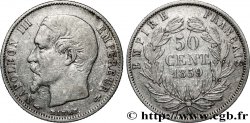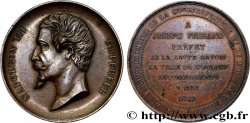fme_374087 - SECOND EMPIRE Médaille de la ville de Lille
недоступный.
Товар уже продан в нашем интернет-магазине (2017)
Цена: : 200.00 €
Товар уже продан в нашем интернет-магазине (2017)
Цена: : 200.00 €
Тип Médaille de la ville de Lille
Дата: 1867
Монетный двор / Город: 59 - Lille
Металл: copper
Диаметр: 90,5 mm
Ориентация осей монеты: 12 h.
Гравер A. BUREAU A LILLE. - DÉPOSÉE
Вес: 367 g.
Век: lisse + abeille CUIVRE
Комментарии о состоянии
Belle et imposante médaille en bon état malgré des traces de circulation. Patine brune, un peu plus sombre autour des reliefs
Лицевая сторона
Аверс: легенда: VILLE DE LILLE / PORTE DE PARIS.
Аверс: описание: Vue de la porte de Paris dans un listel intérieur légende autour.
Обратная сторона
Реверс: легенда: FÊTE / BISSÉCULAIRE / 27 AOÛT / 1867.
Реверс: Описание: Légende en quatre lignes dans une couronne de lauriers et de chêne.
Комментарий
La porte de Paris est une des portes des anciens remparts de la ville de Lille. Reconstruite à la fin du XVIIe siècle en arc de triomphe pour célébrer les victoires de Louis XIV, elle est parfois considérée comme un chef d'œuvre de l'art militaire. Elle est classée monument historique en 1875.
En 1667, en huit jours (19-27 août), Lille est prise par les armées françaises menées par Sébastien Le Prestre de Vauban, simultanément avec Douai. Son rattachement au Royaume de France est officialisé le 2 mai 1668, par le traité d’Aix-la-Chapelle. La même année, Vauban commence à fortifier la ville et est nommé gouverneur de la citadelle. En 1672, Charles de Batz de Castelmore d'Artagnan est brièvement gouverneur de la ville..
En 1667, en huit jours (19-27 août), Lille est prise par les armées françaises menées par Sébastien Le Prestre de Vauban, simultanément avec Douai. Son rattachement au Royaume de France est officialisé le 2 mai 1668, par le traité d’Aix-la-Chapelle. La même année, Vauban commence à fortifier la ville et est nommé gouverneur de la citadelle. En 1672, Charles de Batz de Castelmore d'Artagnan est brièvement gouverneur de la ville..








 Cообщить об ошибке
Cообщить об ошибке Распечатать страницу
Распечатать страницу Отправить мой выбор
Отправить мой выбор Задать вопрос
Задать вопрос Consign / sell
Consign / sell
 Информация
Информация









